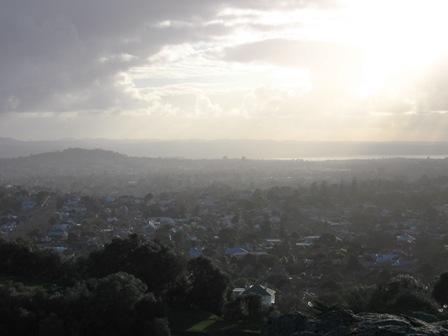Connectivity
Wednesday, May 16, 2007
Sunday, May 13, 2007
 Scott's book 'To the Moon, in Seven Easy Steps' is now out and can be bought through Titus Books and at bookstores like Timeout in Mt Eden, Parsons Bookshop Auckland, Unity Wellington and Auckland, UBS in Dunedin.
Scott's book 'To the Moon, in Seven Easy Steps' is now out and can be bought through Titus Books and at bookstores like Timeout in Mt Eden, Parsons Bookshop Auckland, Unity Wellington and Auckland, UBS in Dunedin. Jack Ross wrote on the backcover:"Scott Hamilton's heroes, like WH Auden's 'helmeted airmen', are forever setting out on some doomed quest...Scott delves into the mytho-poetic past of New Zealand, showing that this past is alive and shared"

Katyn (for Cerian)
The soldier stepped out of the pines, and walked
to the centre of the clearing, and knelt
and dug a hole, a long shallow hole, with his hands,
and lay down in his hole
and covered himself with dirt
and had a heart attack.
This happened five thousand times, maybe
more, in Katyn forest, in 1940.
At the Cheeky Kumara Cafe
we choose a window table.
Threshers the size of tanks
level a field of wheat,
a field of barley,
and three moths stick to our window.
They are scraps of paper,
scraps of thin yellow paper,
Polish army stationery issue,
scraps from the same page of a letter,
from Leszek Staff's last letter to Gertrude Boll,
written in Smolensk, on May the 5th, 1940,
and torn up by an NKVD intelligence officer
who got hard reading about troop movements
and resistance cellsnot a pair of silk lace stockings
slipping off freshly shaven legs
in Krakow Municipal Gardens.
You stir the last of the sugar into my tea.
We know how to dispose of our dead
correctly. Follow that gravel road
over a train track, then up a small hill
until the fields part for a red-rooved chapel
and its flock of stones.
Every name there faces north.
Out the back, behind the water tap,
are plots reserved for the elderly, the infirm.
Red earth foams over the newest graves.
This afternoon the reverend's outmaking his rounds,
and relatives are at the races.
Nobody is there to see Leszek Staff
stagger out of the barley, and fall
to his knees, and dig
for four minutes, in the soft red soil,
and lie down comfortably
to die, to be discovered.
Outside the cafe
a truck backfires.
Delhi, 1857: a bloody warning to today's imperial occupiers

A century and a half after the Indian mutiny, echoes of the arrogance and lies that sparked insurgency could not be clearer
William Dalrymple Thursday May 10, 2007 The Guardian
Soon after dawn on May 11 1857, 150 years ago this week, the Mughal Emperor Bahadur Shah Zafar was saying his morning prayers in his oratory overlooking the river Jumna when he saw a cloud of dust rising on the far side of the river. Minutes later, he was able to see its cause: 300 East India Company cavalrymen charging wildly towards his palace...read the rest of this interesting article here
More on the Indian Mutiny here
My first attempt at a poem in 13 years (with assistance from Maps).
the cicada stepped out of its skin
into the breeze
she picks the shell
gently
off the pine sap
the dumpy dripping staligmite
she lets the breeze lift it
drop it
onto broken needles
where a condom leaks
like a punctured jellyfish




